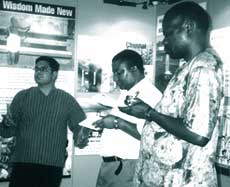| |
A NEW BEGINNING |
|
| Forging
ties
|
||
WATER LITERACY |
||
| Informing
people Water play The facilitator Water Gala |
||
| IN FOCUS | ||
| Faulty
perceptions Thirst rises, patience evaporates |
||
URBAN WETLANDS |
||
| Eviction
ordered Join the BIG fight Citizens pick up cudgels Solar lakes |
||
| WATER MANAGEMENT | ||
| South
India: Searching for an identity Thailand: Then came progress.... |
||
INITIATIVE |
||
| An eye
opener Naudihi’s revival Tankas of Badi Ghodan Dialogue |
||
CSE'S LATEST DESIGNS |
||
| Sri
Aurobindo Ashram’s system |
||
TECHNOLOGY |
||
| Rice
husk ash filter Clay pot irrigation |
||
| JAL YODHAS | ||
| Sachidanand
Bharti Madhu Bhatnagar |
||
TRADITION |
||
| Naullahs
of Kumaon |
||
WATER IN NEWS |
||
| Kerala,
building up its jalanidhi Schemes or scams? |
||
GREEN WATER HARVESTER'S NEWS |
||
| Saving
lives Rain associations Review |
||
CLASSROOM |
||
| Drop by
drop Water scramble |
||
FUNDING AGENCY |
||
| Oxfam
and water |
||
| 100
promises, deadline 2006 The landmarks Changing currents |
||

Vol. 5
No.
2
April-May 2003
![]()
 |
Forging ties CSE and RELMA join hands to promote RWH in Asia and Africa |
|
CSE and RELMA have entered into a partnership - ‘Green water harvester’s network’ to spread awareness about the potential of rainwater harvesting practices (RWH) in Africa and south Asia. The 18 nations forming this network are: Kenya,Tanzania, Uganda, Ethiopia, Eritrea, Rwanda, Somaliland, Zambia, Zimbabwe, Mozambique, Botswana, South Africa, India, Pakistan, Nepal, Bangladesh and Bhutan. While working together, CSE will focus on the south Asian region while RELMA will cover eastern and southern Africa. Global Water Partnership, an international organisation, is funding this project, which gives both CSE and RELMA an added advantage to share and learn from the experiences of other international actors.
 |
At the rain centre, Chennai |
Obote and Malesu’s journey began with the Rain Centre, Chennai, where they got a thorough orientation on RWH. Malesu found the centre to be ‘meticulously planned for the visitors’. The linkages drawn between the national and local water scenario in the panels, and the presence of a technical expert was admired. Later in the day, the visitors went to see the 600 year old temple tank located at Pammal, 20 km south west of Chennai. An interaction with the locals about the revival efforts amazed the guests. Obote said, "It is rare to find initiatives like these in urban areas". Village Thalambedu was the next stop. This visit looked at the tank management efforts of a Madurai-based NGO,Dhan Foundation. Neerkattis (water managers) shared their age-old water management practices with them.
Ralegaon Siddhi in Maharashtra acquainted the guests with the instrumental role of watersheds in ushering a new life in rural India. Hardevsinh Jadeja, the ex-sarpanch and the initiator of the water works in village Raj Samadhiyala. This village has enough water to irrigate, despite years of water scarcity. Impressed by Jadeja’s work, Malesu invited him to visit Africa. Laporiya in Rajasthan was the last stop, where Laxman Singh, the dynamic local leader has developed a unique system — chauka (dykes) for managing pastures and water.This visit has paved the way to share and replicate experiences in both the continents.
For details:Eklavya Prasad at: water@cseindia.org / M Malesu at: M.MALESU@CGIAR.ORG
